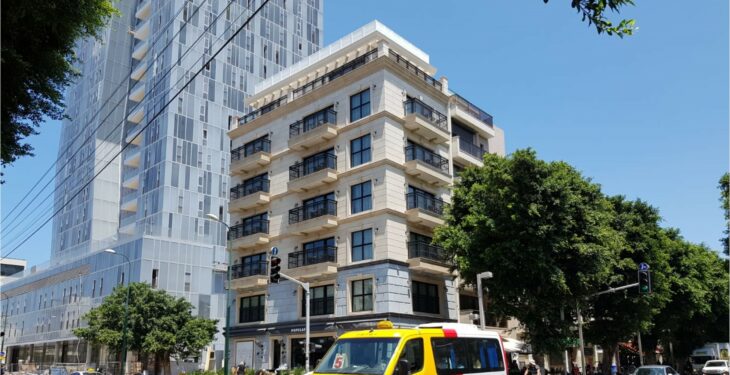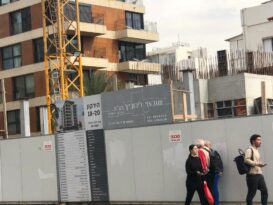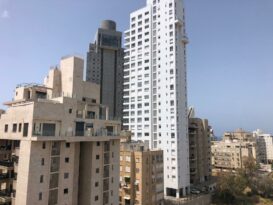A shortage of housing, an excessive amount of regulations, inefficient transportation systems, and a belief that prices will never come down. Why the cost of homes in Israel is so high.
Anyone who takes a look at Israel real estate will quickly learn that homes in Israel are expensive. Extremely expensive.
The average price of a 4-room (3-bedroom) apartment in a high-rise building in Israel is approximately NIS 1.93 million ($560,000), and the closer one gets to the high-demand center of the country, the higher the price climbs. The average price of such an apartment in the Dan Region – an area that includes Tel Aviv and the adjacent cities of Ramat Gan, Givatayim, Bnei Brak, and Rishon Letzion – is NIS 3.13 million ($915,000) and in Tel Aviv, the average price is NIS 4.3 million, or close to $1.25 million. In Jerusalem, the average price is NIS 2.76 million ($810,000).
While the prices in Tel Aviv and Jerusalem can be somewhat justified by the metropolitan status of these cities, in Ashdod (NIS 2 million), Petah Tikva (NIS 2.36 million) or Holon (NIS 2.11 million) – all middle-class cities – the prices are harder to justify.
Until about 15 years ago, the housing market in Israel was completely different, with the average price tag of a 4-room apartment around NIS 700,000. However, a combination of circumstances that occurred in 2007 and 2008 triggered a wave of price hikes, resulting in an inflation-adjusted increase of around 140% in prices since then. Despite the government’s efforts to halt this and get prices under control, that wave has continued with varying intensity.
1. Supply: Shortage of 100,000 apartments
In every discussion on the topic of inflated home prices in Israel, the main reason voiced is a shortage of housing available. Each year 50,000-55,000 new households join the market, while the number of new apartments built (“housing starts”) does not meet the demand.
It is important to note that the responsibility for the supply of new homes rests first and foremost with the government, via two branches that it wholly controls. The first is the Israel Land Authority (ILA), which is in charge of all the state-owned land, and accounts for 93% of land in Israel. So essentially, while only 7% of land in Israel is privately owned, the government controls the land reserves. The second government branch is the urban planning section, which approves all building plans and has the power to determine the number and location of apartments that may be built.
From 2005 until 2010, during which time the price rises first began, the number of housing starts each year was between 30,000 and 35,000. During those years, the government approved the zoning of too little land for the construction of residential apartments, and where land was approved, the planning system worked very slowly in processing and granting building permits.
In the years following 2010, when the government eventually realized that a housing crisis was looming, large tracts of land were approved for residential construction, and regulations were eased in order to accelerate the construction process. In 2012-2014, housing starts increased to between 43,000 and 48,000 apartments annually, and in 2015-2019 each year between 50,000 and 57,000 new apartments were built. In those years, the government managed to meet the growing demand for apartments but was actually still contending with a “deficit” of around 100,000 apartments, and this shortfall continues to plague the Israeli housing market to this day. During the past year, the government succeeded in accelerating the rate of granting building permits and managed to increase housing starts to more than 70,000. But in order to successfully cover the deficit from previous years, the government will have to maintain this pace for many years to come and even increase it.
2. The Metropolis: Where everyone wants to live
Another reason for the high price of homes in Israel lies in the unique form of the country— built around a single metropolis, Tel Aviv, where most of the economic activity is concentrated. The majority of the Israeli public likes to live in Tel Aviv or in one of the nearby cities, and for good reasons: the big city offers more employment opportunities, a high level of services, rich cultural life, etc. These benefits are clearly expressed in apartment prices – which get lower and lower the farther away one goes from the center.
In Israel’s crowded central region, however, the government’s land reserves are actually running out, unlike the vast land reserves in the Northern Galilee and the Southern Negev regions. The problem is that relatively few people are interested in living in those areas, resulting in the reluctance of building developers to undertake projects there, for fear that the apartments will not sell. A fundamental change in that situation could occur if the government would invest in the periphery, and encourage the establishment of competing cities that would also turn into centers of business and culture. Despite the many statements on this issue, by various governments – such a reality has yet to materialize.
3. Transportation: Inadequate mass-transit systems
The upgrading of the transportation infrastructure could also improve the situation. If Israel had high-speed trains that could bring people from Be’er Sheba or Afula to Tel Aviv within half an hour, those cities – which have large land reserves for residential construction – would become viable housing alternatives for people interested in continuing to work in the Tel Aviv area.
Israel’s transportation infrastructure, however, still favors private cars, and the existing mass-transit systems are out-of-date and inefficient. Only in June 2020, following multiple delays, was the high-speed train between Tel Aviv and Jerusalem finally inaugurated. Similarly, the first mass transit line in the Dan Region is currently being built, and after many delays in its construction, the estimated completion date is the first half of 2023. In addition, the final plans for the construction of the Gush Dan metro system are currently being approved, however, operation is only expected to begin in the middle of the coming decade.
4. Local Authorities: Negative incentive to increase supply
Another barrier that constitutes a real obstacle to increasing the supply of homes in the country is the local government, or rather – the method of financing local government used in Israel. Most local authorities are hostile toward new construction. Many think that the reason for this is fear of overloading infrastructure, the reluctance of residents to live near construction sites, and other understandable reasons for opposition to residential construction. While all this is true, it is still not the main reason for the local authorities resistance to increasing residential volume in their territories.
The reason is much simpler and has to do with arnona – the municipal tax paid by each holder of real estate in the area of the authority. While the property tax for residential properties is quite low, the property tax paid for areas with business use – offices, commerce, industry, and so on – is around five times higher. Added to this is the fact that it is precisely the consumers of residential areas, who, as stated, pay low property taxes, are the main consumers of the authority’s services who demand education, cleaning, sanitation, gardening, welfare, culture, religious services and so on, whereas commercial real estate owners require only cleaning, more or less. In fact, under the current financing method – the addition of residential users only increases the authority’s expenditures and adds to their deficit, and this is the reason for the lack of motivation of the local authorities to build more apartments in their areas.
5. Expectations: No one believes that the price of homes in Israel will go down
Finally, the Israeli real estate market, just like everywhere else, is a market of expectations. Following many years of rising prices, and after so many unsuccessful attempts and promises by the various governments to bring prices down – there are few who believe that the prices of homes in Israel will recede.
That state of mind is of tremendous importance, specifically in years during which the circumstances were actually ripe for prices to decline, and there were indeed such years. In 2017 and 2018, for example, objectively speaking, apartment prices should have decreased. The government plan for building subsidized housing for first-time buyers was in full swing; heavy taxation on investors eliminated many from the Israeli market, and housing developers were stuck with “merchandise” that few were interested in purchasing. Nevertheless, 2017 ended with apartment prices 1.4% higher than in 2016.
Then, in 2018, the market was slow, yet prices went down minimally – by only 0.6%. The explanation for this is quite simple. Anyone who wanted to sell – both building contractors or private homeowners – preferred to wait until the market conditions improve, rather than lower their prices, even marginally. Starting in 2019, their expectations were realized and prices resumed their upward trend, while during 2021 and 2022, prices began to rise sharply at a rate of close to 20% per year.
Therefore, even when the market calms and sales decline, home sellers in Israel know that there is no reason to lower their asking price since the next sharp increase is likely to be around the corner.








